Zydus Lifesciences Bundle
Who Really Owns Zydus Lifesciences?
Unraveling the ownership structure of Zydus Lifesciences SWOT Analysis is key to understanding its strategic moves and future potential. From its roots as Cadila Healthcare to its current status as a global pharmaceutical leader, the journey of Zydus Lifesciences has been shaped by significant ownership shifts. Knowing who controls this Indian pharmaceutical company can provide invaluable insights for investors and industry watchers alike.
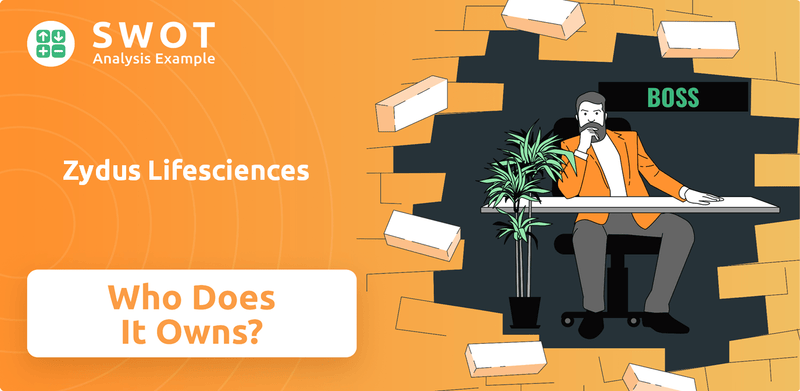
This exploration into Zydus ownership will reveal the key players and pivotal moments that have shaped the company's trajectory. Understanding the major stakeholders, including the founding families and public shareholders, is crucial for grasping the company's governance and strategic direction. Whether you're interested in the Zydus owner, the company structure, or the Zydus Lifesciences parent company, this analysis provides a comprehensive overview.
Who Founded Zydus Lifesciences?
The story of Zydus Lifesciences, formerly known as Cadila, began in 1952. It was founded by Ramanbhai Patel, a former lecturer, and Indravadan Modi. The initial ownership of the Indian pharmaceutical company was shared between these two families.
The early years saw the company grow under the joint leadership of the Patel and Modi families. However, this arrangement evolved, leading to a significant restructuring. This pivotal moment reshaped the company's future.
In 1995, a crucial decision was made to split the business interests of the Patel and Modi families. This separation was a defining event in the history of Zydus Lifesciences, clarifying the ownership structure and setting the stage for future growth. The Modi family's share transitioned into Cadila Pharmaceuticals.
Ramanbhai Patel and Indravadan Modi founded the company.
The ownership was initially shared between the Patel and Modi families.
The business interests were split, with the Modi family forming Cadila Pharmaceuticals.
Cadila Healthcare, the precursor to Zydus Lifesciences, became the holding company for the Patel family.
The restructuring established the Patel family as the primary owners.
Pankaj R. Patel, son of the founder, took charge.
The 1995 restructuring was critical for Zydus ownership. It solidified the Patel family's control. The early agreements would have been crucial in formalizing the separation. The evolution highlights the importance of strategic decisions in shaping a company's trajectory. To learn more about the company, you can read this article about Zydus Lifesciences.
- Zydus Pharmaceuticals was not part of the initial ownership structure.
- The split in 1995 was a turning point for Cadila Healthcare.
- Pankaj R. Patel's leadership was central to the company's future.
- The early ownership structure set the stage for the company's growth.
Zydus Lifesciences SWOT Analysis
- Complete SWOT Breakdown
- Fully Customizable
- Editable in Excel & Word
- Professional Formatting
- Investor-Ready Format
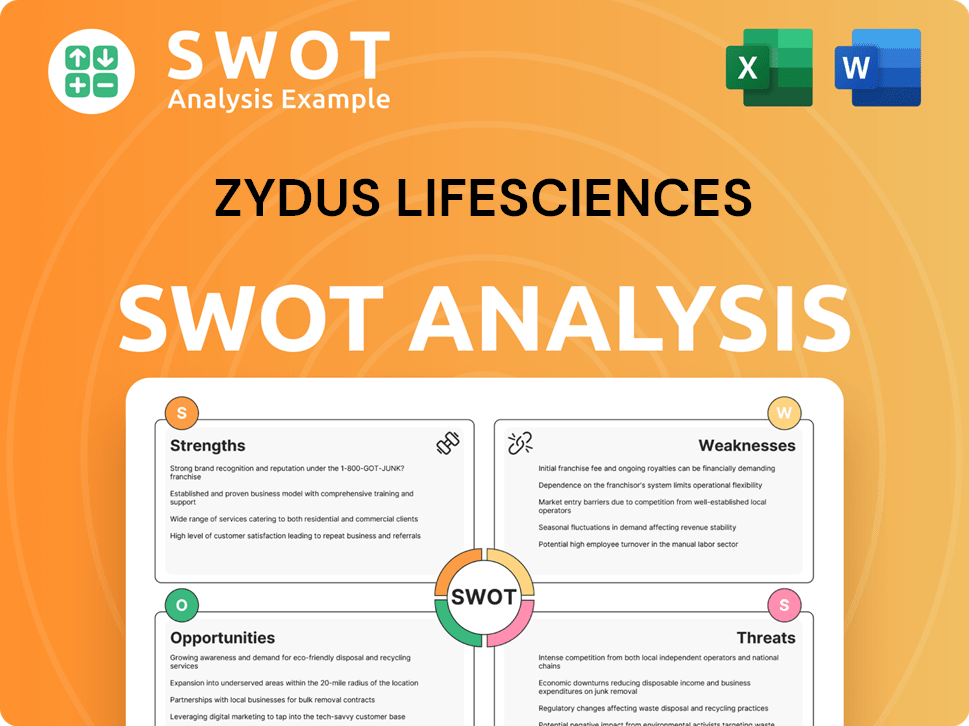
How Has Zydus Lifesciences’s Ownership Changed Over Time?
The ownership structure of Zydus Lifesciences, formerly known as Cadila Healthcare, has evolved significantly since its initial public offering (IPO) in February 2000. The company's listing on the Bombay Stock Exchange (BSE) marked a key moment in its ownership journey. As of October 2023, the company's market capitalization was approximately ₹52,000 crore, demonstrating its strong market presence as an Indian pharmaceutical company.
The evolution of Zydus Lifesciences' ownership reflects the dynamic nature of the pharmaceutical industry and the company's growth trajectory. Understanding the key stakeholders and their respective holdings provides valuable insights into the company's strategic direction and stability. The information on Revenue Streams & Business Model of Zydus Lifesciences further illustrates the company's financial landscape.
| Ownership Category | March 2025 | December 2024 |
|---|---|---|
| Promoter Group | 74.99% | 74.99% |
| Foreign Institutional Investors (FIIs) | 7.31% | 7.53% |
| Domestic Institutional Investors (DIIs) | 4.40% | 4.37% |
| Mutual Funds | 6.36% | 6.32% |
| Public Shareholders | 6.94% (May 2025) | Data not available |
The Promoter Group, led by the Patel family, remains the dominant Zydus owner, holding a substantial stake of 74.99% as of March 2025. Pankaj R. Patel serves as Chairman, with Sharvil P. Patel as Managing Director since July 2017, ensuring the family's continued influence. Institutional investors, including Foreign Institutional Investors (FIIs) and Domestic Institutional Investors (DIIs), hold significant portions. FIIs held 7.31% in March 2025, while DIIs held 4.40%. Mutual Funds increased their holdings to 6.36% by March 2025. Public shareholders accounted for 6.94% of the ownership as of May 2025.
The Patel family's significant ownership ensures strong control over Zydus Lifesciences.
- Institutional investors play a crucial role in the company's ownership structure.
- Mutual Funds are increasing their stake, reflecting confidence in the company.
- The ownership structure highlights the company's stability and strategic direction.
- The company is a public company, with shares traded on the BSE.
Zydus Lifesciences PESTLE Analysis
- Covers All 6 PESTLE Categories
- No Research Needed – Save Hours of Work
- Built by Experts, Trusted by Consultants
- Instant Download, Ready to Use
- 100% Editable, Fully Customizable
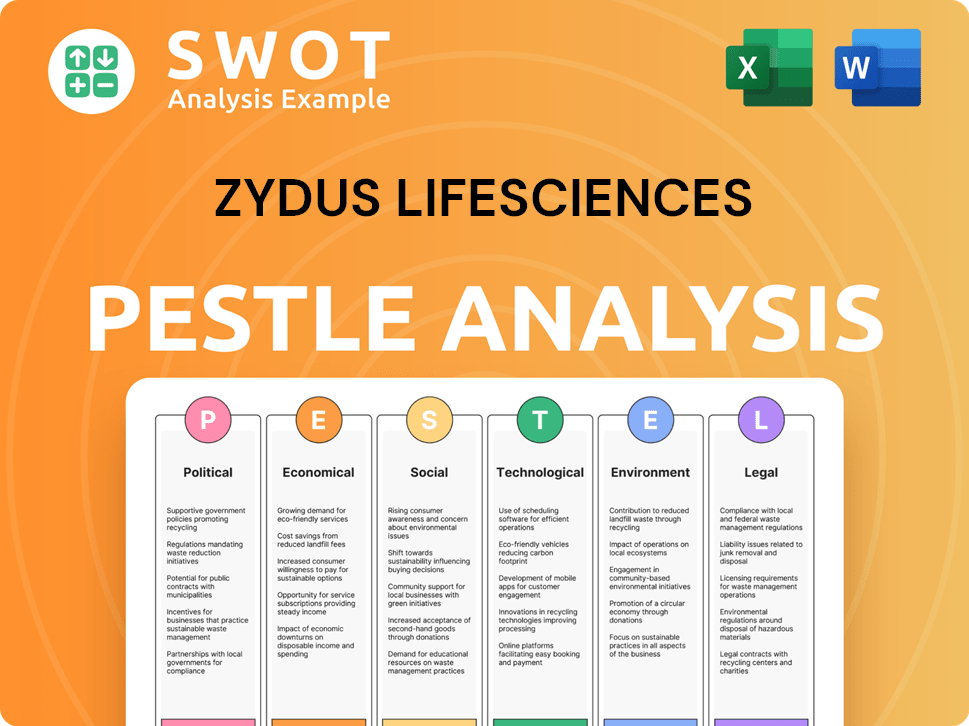
Who Sits on Zydus Lifesciences’s Board?
The current board of directors of Zydus Lifesciences, an Indian pharmaceutical company, plays a pivotal role in the company's governance. The leadership includes Pankaj R. Patel as Chairman, and his son, Sharvil P. Patel, serving as the Managing Director. As of February 28, 2025, the board comprised Mukesh Mangalbhai Patel, Sharvil Pankajbhai Patel, and seven other members. Notable figures on the board include Bhadresh Shah and Upasana Konidela.
The composition of the board reflects a blend of family leadership and external expertise, which influences the strategic direction of Zydus Lifesciences. Understanding the board's structure is essential for grasping the dynamics of Zydus ownership and the decision-making processes within the company. For more insights into the company's background, you can read about the Brief History of Zydus Lifesciences.
| Board Member | Position | Date of Appointment (Approximate) |
|---|---|---|
| Pankaj R. Patel | Chairman | N/A (Founder) |
| Sharvil P. Patel | Managing Director | N/A |
| Mukesh Mangalbhai Patel | Director | N/A |
| Bhadresh Shah | Director | N/A |
| Upasana Konidela | Director | N/A |
The voting structure at Zydus Lifesciences generally follows a one-share-one-vote principle, common in publicly listed Indian companies. The Patel family's significant promoter holding, which stood at 74.99% as of March 2025, provides them with substantial control. This high stake allows them to exert considerable influence over strategic decisions and major initiatives. There have been no recent reports of significant proxy battles or activist investor campaigns that have challenged this control structure, indicating a stable ownership environment.
The Patel family's significant ownership stake ensures strong control over the company's direction.
- The board includes family members and independent directors.
- The voting structure is standard for publicly listed companies.
- Promoter holdings are a key factor in the company's governance.
- Understanding the ownership structure is crucial for stakeholders.
Zydus Lifesciences Business Model Canvas
- Complete 9-Block Business Model Canvas
- Effortlessly Communicate Your Business Strategy
- Investor-Ready BMC Format
- 100% Editable and Customizable
- Clear and Structured Layout
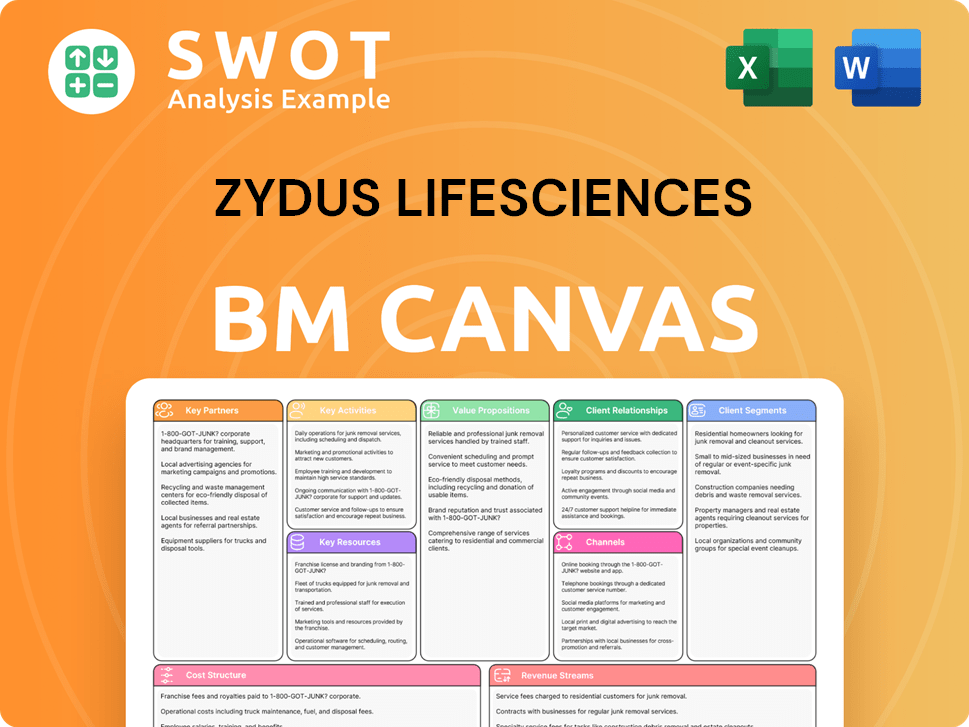
What Recent Changes Have Shaped Zydus Lifesciences’s Ownership Landscape?
Over the past few years, Zydus Lifesciences, an Indian pharmaceutical company, has seen significant changes impacting its ownership and market presence. In May 2024, Bayer acquired full ownership of Bayer Zydus Pharma Pvt Ltd, concluding their joint venture. This shift highlights evolving strategic partnerships within the pharmaceutical sector.
More recently, on March 11, 2025, Zydus announced its acquisition of an 85.6% stake in Amplitude Surgical SA, a French orthopedic medical technology company, for €256.8 million. This move, expected to be finalized by Q3 2025, is part of Zydus' strategy to expand into surgical technologies. Further developments include a strategic collaboration with Agenus Inc. on June 3, 2025, involving the acquisition of biologics manufacturing sites and a strategic equity investment. These actions reflect Zydus' commitment to growth and diversification within the pharmaceutical landscape.
| Metric | March 2024 | December 2024 | March 2025 |
|---|---|---|---|
| Promoter Holdings | ~74.98% | ~74.99% | ~74.99% |
| FII Holdings | - | 7.53% | 7.31% |
| Mutual Funds | - | 6.32% | 6.36% |
Regarding ownership trends, promoter holdings in Zydus Lifesciences have remained stable at approximately 74.98% to 74.99% from March 2024 to March 2025, indicating consistent family control. While Foreign Institutional Investors (FIIs) slightly decreased their holdings, Mutual Funds increased their stake over the same period. This data provides insights into the dynamics of Zydus ownership and the interests of key shareholders. For more information on the competitive landscape, consider exploring the Competitors Landscape of Zydus Lifesciences.
Zydus Lifesciences is acquiring an 85.6% stake in Amplitude Surgical SA. The deal is valued at €256.8 million, marking a significant expansion into the MedTech sector. This strategic move is expected to be completed by Q3 2025.
Zydus Lifesciences has entered a strategic collaboration with Agenus Inc. This includes acquiring biologics manufacturing sites and a strategic equity investment. The upfront consideration for the sites is $75 million, with potential additional payments.
Promoter holdings have remained stable at around 74.98% to 74.99% from March 2024 to March 2025. FII holdings saw a slight decrease, while Mutual Funds increased their stake, indicating investor confidence.
Zydus Lifesciences continues to evolve with strategic acquisitions and collaborations. These moves are aimed at strengthening its market position and diversifying its portfolio. The company’s focus remains on growth and innovation.
Zydus Lifesciences Porter's Five Forces Analysis
- Covers All 5 Competitive Forces in Detail
- Structured for Consultants, Students, and Founders
- 100% Editable in Microsoft Word & Excel
- Instant Digital Download – Use Immediately
- Compatible with Mac & PC – Fully Unlocked
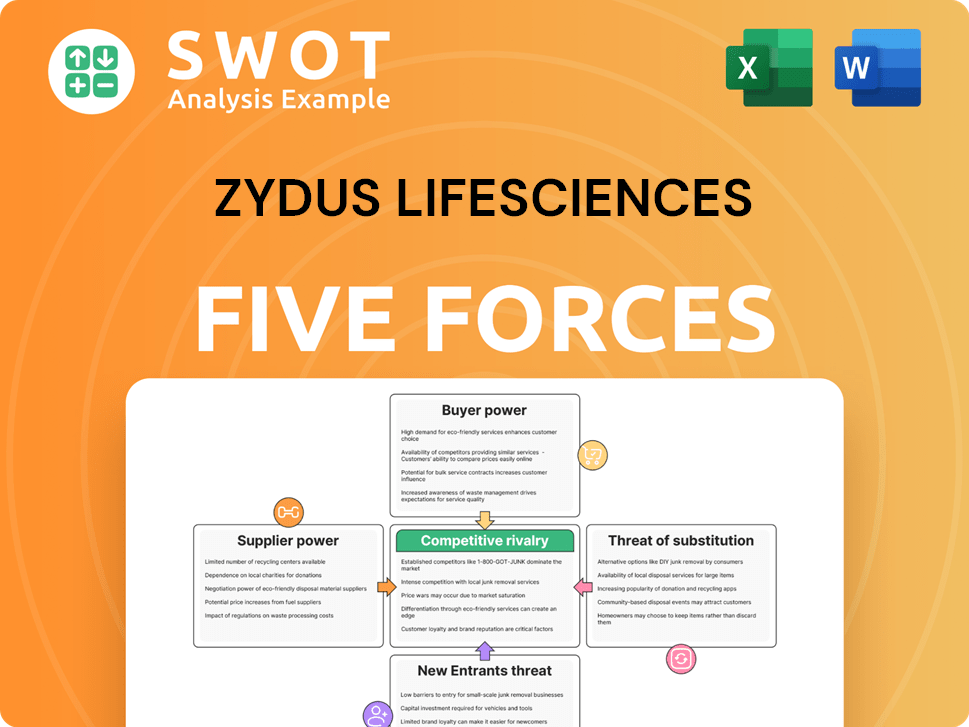
Related Blogs
- What are Mission Vision & Core Values of Zydus Lifesciences Company?
- What is Competitive Landscape of Zydus Lifesciences Company?
- What is Growth Strategy and Future Prospects of Zydus Lifesciences Company?
- How Does Zydus Lifesciences Company Work?
- What is Sales and Marketing Strategy of Zydus Lifesciences Company?
- What is Brief History of Zydus Lifesciences Company?
- What is Customer Demographics and Target Market of Zydus Lifesciences Company?
Disclaimer
All information, articles, and product details provided on this website are for general informational and educational purposes only. We do not claim any ownership over, nor do we intend to infringe upon, any trademarks, copyrights, logos, brand names, or other intellectual property mentioned or depicted on this site. Such intellectual property remains the property of its respective owners, and any references here are made solely for identification or informational purposes, without implying any affiliation, endorsement, or partnership.
We make no representations or warranties, express or implied, regarding the accuracy, completeness, or suitability of any content or products presented. Nothing on this website should be construed as legal, tax, investment, financial, medical, or other professional advice. In addition, no part of this site—including articles or product references—constitutes a solicitation, recommendation, endorsement, advertisement, or offer to buy or sell any securities, franchises, or other financial instruments, particularly in jurisdictions where such activity would be unlawful.
All content is of a general nature and may not address the specific circumstances of any individual or entity. It is not a substitute for professional advice or services. Any actions you take based on the information provided here are strictly at your own risk. You accept full responsibility for any decisions or outcomes arising from your use of this website and agree to release us from any liability in connection with your use of, or reliance upon, the content or products found herein.